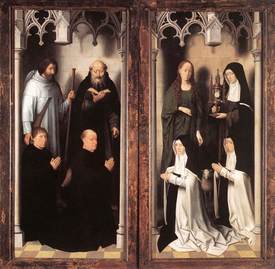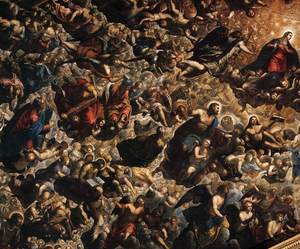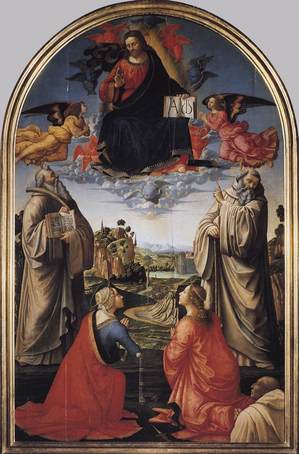We beseech Thee, O Lord, grant that the example of the holy Monks [and nuns] may stir us to a better life, so that we may imitate the actions of those whose solemnity we celebrate.
Tag: All Saints
No such thing as a dead saint
The expression “a living saint” can be misleading. Certainly, we have encountered people in our own lives who fit that description, as best as we can judge. The Holy Church makes the final decision about saints. We celebrate them especially on All Saints’ Day, and on All Souls’ Day, we pray for our loved ones who are drawing more closely into the aura of holiness. The saints on the calendar are only the tip of the iceberg, and most of the saints who have ever existed are known to God alone. Perhaps churches should have a shrine to “The Unknown Saint” quite as we have a Tomb of the Unknown Soldier. All Saints’ Day is rather like that.
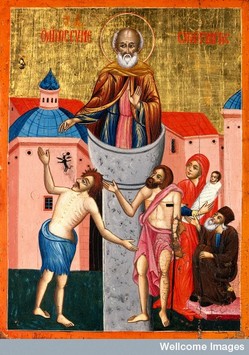 My point, though, is that there is no such thing as a dead saint.There are saints alive now, and there are saints who have physically died, but all are alive in Christ and they are “busy” in heaven, to use a temporal metaphor. Some saints capture the popular imagination more in one generation than in another. For instance, St. Simon Stylites was admired in Syria in the fifth century for spending most of his life seated on top of a pillar. That is not a useful model for our day, although some may still remember Flagpole Kelly, and not long ago thousands of New Yorkers went to watch a man spend a week on top of a column up the street in Bryant Park.
My point, though, is that there is no such thing as a dead saint.There are saints alive now, and there are saints who have physically died, but all are alive in Christ and they are “busy” in heaven, to use a temporal metaphor. Some saints capture the popular imagination more in one generation than in another. For instance, St. Simon Stylites was admired in Syria in the fifth century for spending most of his life seated on top of a pillar. That is not a useful model for our day, although some may still remember Flagpole Kelly, and not long ago thousands of New Yorkers went to watch a man spend a week on top of a column up the street in Bryant Park.
Millions are drawn to Padre Pio, and some are compelled by an unmeasured fascination with his miraculous spiritual gifts, which were blessings indeed, rather than emulating his heroic humility and discipline. There remains an astonishing cult of St. Thérèse of Lisieux. She was almost the reverse of St. Pio: totally 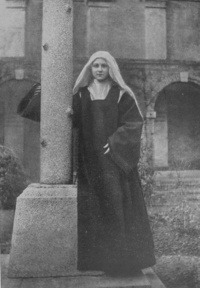 unknown in her earthly lifetime, and accomplishing nothing conspicuous to her contemporaries. She would have remained such had not her spiritual writings been discovered and published. Perhaps she fascinates precisely because in just barely 24 years on earth, she did the most ordinary things with most extraordinary joy. Whenever her relics are taken on pilgrimage to foreign lands (not to mention the one that was taken on a space shuttle), hundreds of thousands pour out to pray by them. This happened most recently in England, where the media were confounded by the huge crowds.
unknown in her earthly lifetime, and accomplishing nothing conspicuous to her contemporaries. She would have remained such had not her spiritual writings been discovered and published. Perhaps she fascinates precisely because in just barely 24 years on earth, she did the most ordinary things with most extraordinary joy. Whenever her relics are taken on pilgrimage to foreign lands (not to mention the one that was taken on a space shuttle), hundreds of thousands pour out to pray by them. This happened most recently in England, where the media were confounded by the huge crowds.
Concurrent with that phenomenon, there were astonishing developments in long-moribund Christian life there, not least of which was the announcement of the first papal state visit to Britain and the expected beatification of John Henry Newman, who predicted a “Second Spring” of Faith in England. Then came news of an Apostolic Constitution, which will provide a unique canonical structure to welcome those desiring union with the Catholic Church. Pope Benedict XVI, who well deserves the title “The Pope of Unity,” has shown the power of the intercessions of the saints.
Rev’d Fr. George Rutler
Church of Our Saviour, NYC
November 1, 2009
All Saints, solemnity
I saw a great multitude which no man could number, out all nations, standing before the throne.
Benedictine All Saints
Today, November 13, we celebrate the feast of All Saints who persevered under the Rule of Saint Benedict are now with God as intercessors for us at the Throne of Grace. The observance of different day for “Benedictine All Saints” is a holdover when the calendar was reformed by Pope Gregory. Nevertheless, the monks, nuns, and oblates who follow the holy Rule venerate the named and un-named saints of their monasteries.
Let us all rejoice in the Lord, celebrating a festival in honor of all the saints who did battle under the Rule of Saint Benedict, at whose solemnity the Angels rejoice and all together praise the Son of God.
With the Church, let us pray,
Almighty and ever-faithful God, who ceaselessly bestow the gift of monastic life upon your Church, grant us, we beseech you, perseverance in that same vocation that we may advance full of gratitude for those who have gone before us on this path, holding nothing more dear than Christ.
All Saints
 The feast of All Saints has observed by the Church at least since the fourth century. For a time it was celebrated on the Sunday following Pentecost due to the obvious link of the outpouring of the Holy Spirit upon the apostles and the foundation of the Church. Tertullian’s famous insight that the Church is built on the blood of the martyrs rings true; the witnesses to the person of Jesus Christ concretizes the Christian faith and makes relevant for us the work of holiness given to us by God. In Rome, Pope Boniface IV consecrated what was the pagan pantheon as the Church of All Saints and moved the liturgical observance of All Saints to November first.
The feast of All Saints has observed by the Church at least since the fourth century. For a time it was celebrated on the Sunday following Pentecost due to the obvious link of the outpouring of the Holy Spirit upon the apostles and the foundation of the Church. Tertullian’s famous insight that the Church is built on the blood of the martyrs rings true; the witnesses to the person of Jesus Christ concretizes the Christian faith and makes relevant for us the work of holiness given to us by God. In Rome, Pope Boniface IV consecrated what was the pagan pantheon as the Church of All Saints and moved the liturgical observance of All Saints to November first.
From a sermon by Saint Bernard of Clairvaux for the feast of All Saints
Why should our praise and glorification, or even our celebration of this feast day, mean anything to the saint? What do they care about earthly honors when their heavenly Father honors them by fulfilling the faithful promise of his Son? What does our commemoration mean to them? The saints have no need of honor from us; neither does our devotion add the slightest thing to what is already theirs. Clearly, when we venerate their memory, it is serving us, not them. But I tell you, when I think of them, I feel myself inflamed by a tremendous longing to be with them.
Calling the saints to mind inspires, or rather arouses in us, above all else, a longing to enjoy their company which is desirable in itself. We long to share in the citizenship of heaven, to dwell with the spirits of the blessed, to join the assembly of patriarchs, the ranks of the prophets, the council of apostles, the great host of martyrs, the noble company of confessors and the choir of virgins. In short, we long to be united in happiness with all the saints. But our dispositions change. The Church of all the first followers of Christ awaits us, but we do nothing about it. The saints want us to be with them, and we are indifferent. The souls of the just await us, and we ignore them.
Come, let us at length spur ourselves on. We must rise again with Christ, we must seek the world which is above and set our mind on the things of heaven. Let us long for those who are longing for us, hasten to those who are waiting for us, and ask those who look for our coming to intercede for us. We should not only want to be with the saints, we should also hope to possess their happiness. While we desire to be in their company, we must also earnestly seek to share in their glory. Do not imagine that there is anything harmful in such an ambition as this; there is no danger in setting our hearts on such glory.
When we commemorate the saints we are inflamed with another yearning: that Christ our life may also appear to us as he appeared to them and that we may one day share in his glory. Until then we see him, not as he is, but as he became for our sake. He is our head, crowned, not with glory, but with the thorns of our sins. As members of that head, crowned with thorns, we should be ashamed to live in luxury; his purple robes are a mockery rather and honor. When Christ comes again, his death shall no longer be proclaimed, and we shall know that we also have died, and that our life is hidden with him. The glorious head of the Church will appear and his gloried member will shine in splendor with him, when he transforms this lowly body anew into such glory as belongs to himself, its head.
Therefore, we should aim at attaining this glory with a wholehearted and prudent desire. That we may rightly hope and strive for such blessedness, we must above all seek the prayers of the saints, that what is beyond our own efforts to obtain may be granted through their intercession.
(Sermon 2; S. Bernardi Opera, ed. J. Leclercq and H. Rochais, vol. V, 1968, pp364-8; ET by ICEL)
With the Church, let us pray,
Almighty and everlasting God, Who has given us in one feast to venerate the merits of all Thy Saints, we beseech Thee through the multitude of intercessors, to grant us the desired abundance of Thy mercy.
